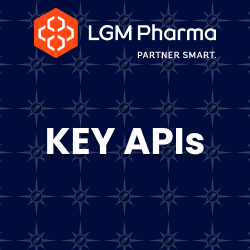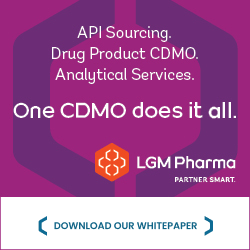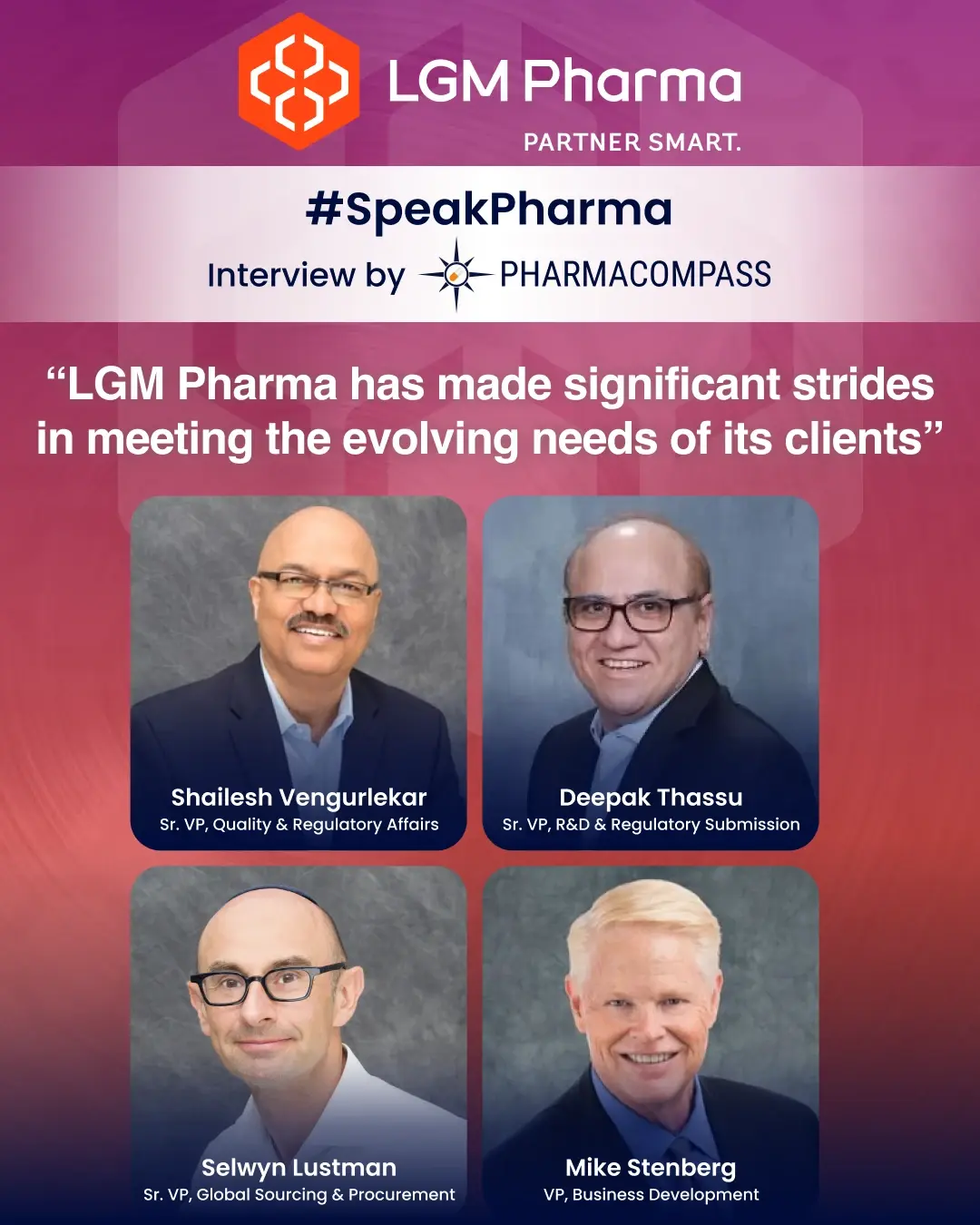12 Mar 2025
// BUSINESSWIRE
18 Nov 2024
// PRESS RELEASE
22 Oct 2024
// PRESS RELEASE
 KEY PRODUCTS
KEY PRODUCTS KEY SERVICES
KEY SERVICES
LGM Pharma accelerates & optimizes the new product pathway from early development through commercialization.
About
Industry Trade Show
Not Confirmed
24-26 February, 2026
BIO Partnering at JPMBIO Partnering at JPM
Industry Trade Show
Not Confirmed
12-15 January, 2026
Biotech ShowcaseBiotech Showcase
Industry Trade Show
Not Confirmed
12-14 January, 2026
CONTACT DETAILS




Events
Webinars & Exhibitions
Industry Trade Show
Not Confirmed
24-26 February, 2026
BIO Partnering at JPMBIO Partnering at JPM
Industry Trade Show
Not Confirmed
12-15 January, 2026
Biotech ShowcaseBiotech Showcase
Industry Trade Show
Not Confirmed
12-14 January, 2026
https://www.pharmacompass.com/speak-pharma/lgm-pharma-has-made-significant-strides-in-meeting-the-evolving-needs-of-its-clients
CORPORATE CONTENT #SupplierSpotlight
https://www.pharmacompass.com/radio-compass-blog/cdmo-activity-tracker-bora-polpharma-make-acquisitions-evonik-euroapi-porton-announce-technological-expansions
https://www.pharmacompass.com/radio-compass-blog/cdmo-activity-tracker-novo-s-parent-buys-catalent-for-us-16-5-bn-fujifilm-merck-kgaa-axplora-lonza-expand-capabilities

12 Mar 2025
// BUSINESSWIRE

18 Nov 2024
// PRESS RELEASE
https://lgmpharma.com/blog/n-zyme-biomedical-and-lgm-pharma-are-developing-the-worlds-first-pepsin-inhibitor-for-reflux-disease/

22 Oct 2024
// PRESS RELEASE
https://lgmpharma.com/blog/new-harbor-capital-portfolio-company-lgm-pharma-promotes-cfo-and-cco/

15 Oct 2024
// PRESS RELEASE
https://lgmpharma.com/blog/lgm-pharma-expands-analytical-testing-services-with-new-endotoxin-and-rapid-sterility-testing-capabilities/

01 Oct 2024
// PRESS RELEASE
https://lgmpharma.com/blog/new-harbor-capital-completes-recapitalization-of-portfolio-company-lgm-pharma-to-support-its-continued-growth/

22 Mar 2024
// PRESS RELEASE
https://lgmpharma.com/blog/lgm-pharma-unveils-enhanced-analytical-testing-services-and-expands-cdmo-portfolio-with-additional-suppository-manufacturing-capabilities/
 FULL SCREEN VIEW Click here to open all results in a new tab [this preview display 10 results]
FULL SCREEN VIEW Click here to open all results in a new tab [this preview display 10 results]
About the Company : LGM Pharma is a global leader in sourcing hard-to-find APIs and intermediates for pharmaceutical and biotech industries. LGM also operates as a full-service CDMO, offering formulation, analytica...
About the Company : LGM Pharma is a global leader in sourcing hard-to-find APIs and intermediates for pharmaceutical and biotech industries. LGM also operates as a full-service CDMO, offering formulation, analytica...
About the Company : LGM Pharma is a global leader in sourcing hard-to-find APIs and intermediates for pharmaceutical and biotech industries. LGM also operates as a full-service CDMO, offering formulation, analytica...
About the Company : LGM Pharma is a global leader in sourcing hard-to-find APIs and intermediates for pharmaceutical and biotech industries. LGM also operates as a full-service CDMO, offering formulation, analytica...
About the Company : LGM Pharma is a global leader in sourcing hard-to-find APIs and intermediates for pharmaceutical and biotech industries. LGM also operates as a full-service CDMO, offering formulation, analytica...
About the Company : LGM Pharma is a global leader in sourcing hard-to-find APIs and intermediates for pharmaceutical and biotech industries. LGM also operates as a full-service CDMO, offering formulation, analytica...
About the Company : LGM Pharma is a global leader in sourcing hard-to-find APIs and intermediates for pharmaceutical and biotech industries. LGM also operates as a full-service CDMO, offering formulation, analytica...
About the Company : LGM Pharma is a global leader in sourcing hard-to-find APIs and intermediates for pharmaceutical and biotech industries. LGM also operates as a full-service CDMO, offering formulation, analytica...
About the Company : LGM Pharma is a global leader in sourcing hard-to-find APIs and intermediates for pharmaceutical and biotech industries. LGM also operates as a full-service CDMO, offering formulation, analytica...
About the Company : LGM Pharma is a global leader in sourcing hard-to-find APIs and intermediates for pharmaceutical and biotech industries. LGM also operates as a full-service CDMO, offering formulation, analytica...
 FULL SCREEN VIEW Click here to open all results in a new tab [this preview display 10 results]
FULL SCREEN VIEW Click here to open all results in a new tab [this preview display 10 results]Details:
The collaboration aims to bring to market a first-in-class, pepsin inhibitor, fosamprenavir that is safe and effective for patients with LPR and/or persistent GERD symptoms.
Lead Product(s): Fosamprenavir Sodium Alginate
Therapeutic Area: Gastroenterology Brand Name: Undisclosed
Study Phase: PreclinicalProduct Type: Miscellaneous
Recipient: N-Zyme Biomedical
Deal Size: Undisclosed Upfront Cash: Undisclosed
Deal Type: Collaboration November 18, 2024
Lead Product(s) : Fosamprenavir Sodium Alginate
Therapeutic Area : Gastroenterology
Highest Development Status : Preclinical
Recipient : N-Zyme Biomedical
Deal Size : Undisclosed
Deal Type : Collaboration
N-Zyme & LGM Pharma Develop World’s First Pepsin Inhibitor for Reflux Disease
Details : The collaboration aims to bring to market a first-in-class, pepsin inhibitor, fosamprenavir that is safe and effective for patients with LPR and/or persistent GERD symptoms.
Product Name : Undisclosed
Product Type : Miscellaneous
Upfront Cash : Undisclosed
November 18, 2024
 FULL SCREEN VIEW Click here to open all results in a new tab [this preview display 10 results]
FULL SCREEN VIEW Click here to open all results in a new tab [this preview display 10 results]Services
Drug Product Manufacturing
Analytical
API & Drug Product Development
ABOUT THIS PAGE
LGM Pharma is a supplier offers 583 products (APIs, Excipients or Intermediates).
Find a price of Abacavir Sulfate bulk offered by LGM Pharma
Find a price of Abiraterone Acetate bulk offered by LGM Pharma
Find a price of Acamprosate Calcium bulk offered by LGM Pharma
Find a price of Aceclofenac bulk offered by LGM Pharma
Find a price of Acetazolamide bulk offered by LGM Pharma
Find a price of Acyclovir bulk offered by LGM Pharma
Find a price of Adalimumab bulk offered by LGM Pharma
Find a price of Adapalene bulk offered by LGM Pharma
Find a price of Afatinib bulk offered by LGM Pharma
Find a price of Agomelatine bulk offered by LGM Pharma
Find a price of Albendazole bulk offered by LGM Pharma
Find a price of Alemtuzumab bulk offered by LGM Pharma
Find a price of Alendronate Sodium bulk offered by LGM Pharma
Find a price of Alfacalcidol bulk offered by LGM Pharma
Find a price of Alfuzosin Hydrochloride bulk offered by LGM Pharma
Find a price of Alirocumab bulk offered by LGM Pharma
Find a price of Allopurinol bulk offered by LGM Pharma
Find a price of Alogliptin Benzoate bulk offered by LGM Pharma
Find a price of Alpha Lipoic Acid bulk offered by LGM Pharma
Find a price of Alprazolam bulk offered by LGM Pharma
Find a price of Alprostadil bulk offered by LGM Pharma
Find a price of Amantadine Hydrochloride bulk offered by LGM Pharma
Find a price of Ambrisentan bulk offered by LGM Pharma
Find a price of Ambroxol Hydrochloride bulk offered by LGM Pharma
Find a price of Aminocaproic Acid bulk offered by LGM Pharma
Find a price of Amisulpride bulk offered by LGM Pharma
Find a price of Amitriptyline Hydrochloride bulk offered by LGM Pharma
Find a price of Amlodipine Besylate bulk offered by LGM Pharma
Find a price of Amorolfine Hydrochloride bulk offered by LGM Pharma
Find a price of Amoxicillin Trihydrate bulk offered by LGM Pharma
Find a price of Amphotericin B bulk offered by LGM Pharma
Find a price of Ampicillin Sodium bulk offered by LGM Pharma
Find a price of Anastrozole bulk offered by LGM Pharma
Find a price of Anidulafungin bulk offered by LGM Pharma
Find a price of Apixaban bulk offered by LGM Pharma
Find a price of Aprepitant bulk offered by LGM Pharma
Find a price of Aripiprazole bulk offered by LGM Pharma
Find a price of Asenapine Maleate bulk offered by LGM Pharma
Find a price of Atazanavir Sulfate bulk offered by LGM Pharma
Find a price of Atenolol bulk offered by LGM Pharma
Find a price of Atezolizumab bulk offered by LGM Pharma
Find a price of Atomoxetin Hydrochloride bulk offered by LGM Pharma
Find a price of Atorvastatin bulk offered by LGM Pharma
Find a price of Atosiban bulk offered by LGM Pharma
Find a price of Atovaquone bulk offered by LGM Pharma
Find a price of Atracurium Besylate bulk offered by LGM Pharma
Find a price of Atropine Sulfate bulk offered by LGM Pharma
Find a price of Avanafil bulk offered by LGM Pharma
Find a price of Axitinib bulk offered by LGM Pharma
Find a price of Azacitidine bulk offered by LGM Pharma
Find a price of Azathioprine bulk offered by LGM Pharma
Find a price of Azelastine Hydrochloride bulk offered by LGM Pharma
Find a price of Azilsartan bulk offered by LGM Pharma
Find a price of Azithromycin Dihydrate bulk offered by LGM Pharma
Find a price of Baclofen bulk offered by LGM Pharma
Find a price of Baricitinib bulk offered by LGM Pharma
Find a price of Bazedoxifene Acetate bulk offered by LGM Pharma
Find a price of Beclomethasone Dipropionate bulk offered by LGM Pharma
Find a price of Bendamustine Hydrochloride bulk offered by LGM Pharma
Find a price of Benzocaine bulk offered by LGM Pharma
Find a price of Beta Nicotinamide Adenine Dinucleotide bulk offered by LGM Pharma
Find a price of Betahistine Dihydrochloride bulk offered by LGM Pharma
Find a price of Betamethasone bulk offered by LGM Pharma
Find a price of Bevacizumab bulk offered by LGM Pharma
Find a price of Bicalutamide bulk offered by LGM Pharma
Find a price of Bilastine bulk offered by LGM Pharma
Find a price of Bimatoprost bulk offered by LGM Pharma
Find a price of Bisacodyl bulk offered by LGM Pharma
Find a price of Bivalirudin bulk offered by LGM Pharma
Find a price of Bortezomib bulk offered by LGM Pharma
Find a price of Bosentan Hydrate bulk offered by LGM Pharma
Find a price of Brexpiprazole bulk offered by LGM Pharma
Find a price of Brimonidine Tartrate bulk offered by LGM Pharma
Find a price of Brinzolamide bulk offered by LGM Pharma
Find a price of Brivaracetam bulk offered by LGM Pharma
Find a price of Bromfenac Sodium bulk offered by LGM Pharma
Find a price of Bromhexine Hydrochloride bulk offered by LGM Pharma
Find a price of Budesonide bulk offered by LGM Pharma
Find a price of Bupivacaine bulk offered by LGM Pharma
Find a price of Buprenorphine bulk offered by LGM Pharma
Find a price of Bupropion Hydrobromide bulk offered by LGM Pharma
Find a price of Bupropion Hydrochloride bulk offered by LGM Pharma
Find a price of Busulfan bulk offered by LGM Pharma
Find a price of Cabazitaxel bulk offered by LGM Pharma
Find a price of Cabergoline bulk offered by LGM Pharma
Find a price of Cabozantinib bulk offered by LGM Pharma
Find a price of Calcipotriol bulk offered by LGM Pharma
Find a price of Calcitriol bulk offered by LGM Pharma
Find a price of Canagliflozin bulk offered by LGM Pharma
Find a price of Candesartan Cilexetil bulk offered by LGM Pharma
Find a price of Capecitabine bulk offered by LGM Pharma
Find a price of Captopril bulk offered by LGM Pharma
Find a price of Carbamazepine bulk offered by LGM Pharma
Find a price of Carbidopa bulk offered by LGM Pharma
Find a price of Carboplatin bulk offered by LGM Pharma
Find a price of Carboprost Tromethamine bulk offered by LGM Pharma
Find a price of Carfilzomib bulk offered by LGM Pharma
Find a price of Carmustine bulk offered by LGM Pharma
Find a price of Caspofungin bulk offered by LGM Pharma
Find a price of Cefdinir bulk offered by LGM Pharma
Find a price of Cefpodoxime Proxetil bulk offered by LGM Pharma
Find a price of Cefuroxime Axetil bulk offered by LGM Pharma
Find a price of Celecoxib bulk offered by LGM Pharma
Find a price of Cetirizine Dihydrochloride bulk offered by LGM Pharma
Find a price of Cetrorelix Acetate bulk offered by LGM Pharma
Find a price of Chloramphenicol Succinate Acid bulk offered by LGM Pharma
Find a price of Chloroquine Phosphate bulk offered by LGM Pharma
Find a price of Chlorpheniramine Maleate bulk offered by LGM Pharma
Find a price of Chlorpromazine Hydrochloride bulk offered by LGM Pharma
Find a price of Cilostazol bulk offered by LGM Pharma
Find a price of Cinnarizine bulk offered by LGM Pharma
Find a price of Ciprofloxacin bulk offered by LGM Pharma
Find a price of Ciprofloxacin Hydrochloride bulk offered by LGM Pharma
Find a price of Cisatracurium Besylate bulk offered by LGM Pharma
Find a price of Cisplatin bulk offered by LGM Pharma
Find a price of Citalopram Hydrobromide bulk offered by LGM Pharma
Find a price of Citicoline Sodium bulk offered by LGM Pharma
Find a price of Clarithromycin bulk offered by LGM Pharma
Find a price of Clenbuterol Hydrochloride bulk offered by LGM Pharma
Find a price of Clindamycin Phosphate bulk offered by LGM Pharma
Find a price of Clobetasol Propionate bulk offered by LGM Pharma
Find a price of Clofarabine bulk offered by LGM Pharma
Find a price of Clomipramine Hydrochloride bulk offered by LGM Pharma
Find a price of Clonazepam bulk offered by LGM Pharma
Find a price of Clonidine bulk offered by LGM Pharma
Find a price of Clopidogrel bulk offered by LGM Pharma
Find a price of Cloprostenol Sodium bulk offered by LGM Pharma
Find a price of Clostebol Acetate bulk offered by LGM Pharma
Find a price of Clotrimazole bulk offered by LGM Pharma
Find a price of Clozapine bulk offered by LGM Pharma
Find a price of Colchicine bulk offered by LGM Pharma
Find a price of Colistimethate Sodium bulk offered by LGM Pharma
Find a price of Crisaborole bulk offered by LGM Pharma
Find a price of Crizotinib bulk offered by LGM Pharma
Find a price of Cyclobenzaprine bulk offered by LGM Pharma
Find a price of Cyclophosphamide bulk offered by LGM Pharma
Find a price of Cyproheptadine Hydrochloride bulk offered by LGM Pharma
Find a price of Cyproterone Acetate bulk offered by LGM Pharma
Find a price of Cytarabine bulk offered by LGM Pharma
Find a price of Daclatasvir bulk offered by LGM Pharma
Find a price of Dapagliflozin bulk offered by LGM Pharma
Find a price of Dapoxetine Hydrochloride bulk offered by LGM Pharma
Find a price of Daptomycin bulk offered by LGM Pharma
Find a price of Daratumumab bulk offered by LGM Pharma
Find a price of Darifenacin Hydrobromide bulk offered by LGM Pharma
Find a price of Dasatinib bulk offered by LGM Pharma
Find a price of Decitabine bulk offered by LGM Pharma
Find a price of Deferasirox bulk offered by LGM Pharma
Find a price of Deflazacort bulk offered by LGM Pharma
Find a price of Desloratadine bulk offered by LGM Pharma
Find a price of Desmopressin Acetate bulk offered by LGM Pharma
Find a price of Desonide bulk offered by LGM Pharma
Find a price of Desoximetasone bulk offered by LGM Pharma
Find a price of Desvenlafaxine Succinate bulk offered by LGM Pharma
Find a price of Dexamethasone bulk offered by LGM Pharma
Find a price of Dexketoprofen Trometamol bulk offered by LGM Pharma
Find a price of Dexlansoprazole bulk offered by LGM Pharma
Find a price of Dextromethorphan Hydrobromide bulk offered by LGM Pharma
Find a price of Diacerein bulk offered by LGM Pharma
Find a price of Diazepam bulk offered by LGM Pharma
Find a price of Diclofenac Sodium bulk offered by LGM Pharma
Find a price of Difluprednate bulk offered by LGM Pharma
Find a price of Diltiazem Hydrochloride bulk offered by LGM Pharma
Find a price of Dimenhydrinate bulk offered by LGM Pharma
Find a price of Dimethyl Fumarate bulk offered by LGM Pharma
Find a price of Dinoprostone bulk offered by LGM Pharma
Find a price of Diphenhydramine Hydrochloride bulk offered by LGM Pharma
Find a price of Divalproex Sodium bulk offered by LGM Pharma
Find a price of Docetaxel bulk offered by LGM Pharma
Find a price of Docusate Sodium bulk offered by LGM Pharma
Find a price of Dolutegravir Sodium bulk offered by LGM Pharma
Find a price of Domperidone bulk offered by LGM Pharma
Find a price of Donepezil bulk offered by LGM Pharma
Find a price of Doripenem bulk offered by LGM Pharma
Find a price of Dorzolamide Hydrochloride bulk offered by LGM Pharma
Find a price of Doxazosin Mesylate bulk offered by LGM Pharma
Find a price of Doxcercalciferol bulk offered by LGM Pharma
Find a price of Doxorubicin Hydrochloride bulk offered by LGM Pharma
Find a price of Doxycycline Hyclate bulk offered by LGM Pharma
Find a price of Doxylamine Succinate bulk offered by LGM Pharma
Find a price of Dronedarone Hydrochloride bulk offered by LGM Pharma
Find a price of Drospirenone bulk offered by LGM Pharma
Find a price of Droxidopa bulk offered by LGM Pharma
Find a price of Duloxetine Hydrochloride bulk offered by LGM Pharma
Find a price of Dutasteride bulk offered by LGM Pharma
Find a price of Dydrogesterone bulk offered by LGM Pharma
Find a price of Econazole Nitrate bulk offered by LGM Pharma
Find a price of Edaravone bulk offered by LGM Pharma
Find a price of Edoxaban Tosylate bulk offered by LGM Pharma
Find a price of Efavirenz bulk offered by LGM Pharma
Find a price of Efinaconazole bulk offered by LGM Pharma
Find a price of Eletriptan Hydrobromide bulk offered by LGM Pharma
Find a price of Emtricitabine bulk offered by LGM Pharma
Find a price of Enoxaparin Sodium bulk offered by LGM Pharma
Find a price of Enrofloxacin bulk offered by LGM Pharma
Find a price of Entacapone bulk offered by LGM Pharma
Find a price of Entecavir bulk offered by LGM Pharma
Find a price of Enzalutamide bulk offered by LGM Pharma
Find a price of Eplerenone bulk offered by LGM Pharma
Find a price of Eptifibatide bulk offered by LGM Pharma
Find a price of Erlotinib Hydrochloride bulk offered by LGM Pharma
Find a price of Ertapenem bulk offered by LGM Pharma
Find a price of Escitalopram Oxalate bulk offered by LGM Pharma
Find a price of Eslicarbazepine Acetate bulk offered by LGM Pharma
Find a price of Esomeprazole Magnesium bulk offered by LGM Pharma
Find a price of Estradiol bulk offered by LGM Pharma
Find a price of Eszopiclone bulk offered by LGM Pharma
Find a price of Etanercept bulk offered by LGM Pharma
Find a price of Ethinyl Estradiol bulk offered by LGM Pharma
Find a price of Etodolac bulk offered by LGM Pharma
Find a price of Etoposide bulk offered by LGM Pharma
Find a price of Etoricoxib bulk offered by LGM Pharma
Find a price of Everolimus bulk offered by LGM Pharma
Find a price of Evolocumab bulk offered by LGM Pharma
Find a price of Exemestane bulk offered by LGM Pharma
Find a price of Exenatide bulk offered by LGM Pharma
Find a price of Ezetimibe bulk offered by LGM Pharma
Find a price of Famciclovir bulk offered by LGM Pharma
Find a price of Famotidine bulk offered by LGM Pharma
Find a price of Favipiravir bulk offered by LGM Pharma
Find a price of Febuxostat bulk offered by LGM Pharma
Find a price of Felbamate bulk offered by LGM Pharma
Find a price of Fenbendazole bulk offered by LGM Pharma
Find a price of Fenofibrate bulk offered by LGM Pharma
Find a price of Fentanyl bulk offered by LGM Pharma
Find a price of Fenticonazole Nitrate bulk offered by LGM Pharma
Find a price of Ferric Carboxymaltose bulk offered by LGM Pharma
Find a price of Fesoterodine bulk offered by LGM Pharma
Find a price of Fexofenadine Hydrochloride bulk offered by LGM Pharma
Find a price of Finasteride bulk offered by LGM Pharma
Find a price of Finerenone bulk offered by LGM Pharma
Find a price of Fingolimod Hydrochloride bulk offered by LGM Pharma
Find a price of Flecainide bulk offered by LGM Pharma
Find a price of Fluconazole bulk offered by LGM Pharma
Find a price of Fludarabine Phosphate bulk offered by LGM Pharma
Find a price of Flumazenil bulk offered by LGM Pharma
Find a price of Flumethasone bulk offered by LGM Pharma
Find a price of Fluocinolone Acetonide bulk offered by LGM Pharma
Find a price of Fluocinonide bulk offered by LGM Pharma
Find a price of Fluoxetine Hydrochloride bulk offered by LGM Pharma
Find a price of Fluticasone Propionate bulk offered by LGM Pharma
Find a price of Fluvoxamine bulk offered by LGM Pharma
Find a price of Folic Acid bulk offered by LGM Pharma
Find a price of Formoterol Fumarate bulk offered by LGM Pharma
Find a price of Fosaprepitant bulk offered by LGM Pharma
Find a price of Fosfomycin Trometamol bulk offered by LGM Pharma
Find a price of Fulvestrant bulk offered by LGM Pharma
Find a price of Gabapentin bulk offered by LGM Pharma
Find a price of Gadobutrol bulk offered by LGM Pharma
Find a price of Gadolinium Dtpa bulk offered by LGM Pharma
Find a price of Ganirelix bulk offered by LGM Pharma
Find a price of Gefitinib bulk offered by LGM Pharma
Find a price of Gemcitabine bulk offered by LGM Pharma
Find a price of Glatiramer Acetate bulk offered by LGM Pharma
Find a price of Gliclazide bulk offered by LGM Pharma
Find a price of Glimepiride bulk offered by LGM Pharma
Find a price of Glipizide bulk offered by LGM Pharma
Find a price of Glycopyrronium Bromide bulk offered by LGM Pharma
Find a price of Goserelin Acetate bulk offered by LGM Pharma
Find a price of Granisetron Hydrochloride bulk offered by LGM Pharma
Find a price of Guaifenesin bulk offered by LGM Pharma
Find a price of Halobetasol bulk offered by LGM Pharma
Find a price of Haloperidol bulk offered by LGM Pharma
Find a price of Heparin Sodium bulk offered by LGM Pharma
Find a price of Homatropine Methylbromide bulk offered by LGM Pharma
Find a price of Human Chorionic Gonadotropin bulk offered by LGM Pharma
Find a price of Hyaluronic Acid bulk offered by LGM Pharma
Find a price of Hydrochlorothiazide bulk offered by LGM Pharma
Find a price of Hydroxyprogesterone Caproate bulk offered by LGM Pharma
Find a price of Hydroxyzine Hydrochloride bulk offered by LGM Pharma
Find a price of Hyoscine Butyl Bromide bulk offered by LGM Pharma
Find a price of Ibandronate Sodium bulk offered by LGM Pharma
Find a price of Ibrutinib bulk offered by LGM Pharma
Find a price of Icatibant Acetate bulk offered by LGM Pharma
Find a price of Idarubicin Hydrochloride bulk offered by LGM Pharma
Find a price of Ifosfamide bulk offered by LGM Pharma
Find a price of Iloprost bulk offered by LGM Pharma
Find a price of Imatinib Mesylate bulk offered by LGM Pharma
Find a price of Imidapril Hydrochloride bulk offered by LGM Pharma
Find a price of Imipramine Hydrochloride bulk offered by LGM Pharma
Find a price of Imiquimod bulk offered by LGM Pharma
Find a price of Indacaterol Maleate bulk offered by LGM Pharma
Find a price of Indapamide bulk offered by LGM Pharma
Find a price of Indomethacin bulk offered by LGM Pharma
Find a price of Infliximab bulk offered by LGM Pharma
Find a price of Iohexol bulk offered by LGM Pharma
Find a price of Iopamidol bulk offered by LGM Pharma
Find a price of Ipilimumab bulk offered by LGM Pharma
Find a price of Ipratropium Bromide bulk offered by LGM Pharma
Find a price of Irbesartan bulk offered by LGM Pharma
Find a price of Iron Sucrose bulk offered by LGM Pharma
Find a price of Isavuconazonium Sulfate bulk offered by LGM Pharma
Find a price of Isoproterenol Hydrochloride bulk offered by LGM Pharma
Find a price of Isotretinoin bulk offered by LGM Pharma
Find a price of Isoxsuprine Hydrochloride bulk offered by LGM Pharma
Find a price of Itopride Hydrochloride bulk offered by LGM Pharma
Find a price of Itraconazole bulk offered by LGM Pharma
Find a price of Ivabradine Hydrochloride bulk offered by LGM Pharma
Find a price of Ivacaftor bulk offered by LGM Pharma
Find a price of Ivermectin bulk offered by LGM Pharma
Find a price of Ketamine Hydrochloride bulk offered by LGM Pharma
Find a price of Ketoconazole bulk offered by LGM Pharma
Find a price of Ketoprofen bulk offered by LGM Pharma
Find a price of Labetalol Hydrochloride bulk offered by LGM Pharma
Find a price of Lacosamide bulk offered by LGM Pharma
Find a price of Lamivudine bulk offered by LGM Pharma
Find a price of Lamotrigine bulk offered by LGM Pharma
Find a price of Lanreotide Acetate bulk offered by LGM Pharma
Find a price of Lansoprazole bulk offered by LGM Pharma
Find a price of Lapatinib Ditosylate bulk offered by LGM Pharma
Find a price of Latanoprost bulk offered by LGM Pharma
Find a price of Ledipasvir bulk offered by LGM Pharma
Find a price of Leflunomide bulk offered by LGM Pharma
Find a price of Lenalidomide bulk offered by LGM Pharma
Find a price of Letrozole bulk offered by LGM Pharma
Find a price of Levalbuterol Hydrochloride bulk offered by LGM Pharma
Find a price of Levocetirizine Dihydrochloride bulk offered by LGM Pharma
Find a price of Levodopa bulk offered by LGM Pharma
Find a price of Levofloxacin bulk offered by LGM Pharma
Find a price of Levonorgestrel bulk offered by LGM Pharma
Find a price of Levothyroxine Sodium bulk offered by LGM Pharma
Find a price of Lidocaine bulk offered by LGM Pharma
Find a price of Lidocaine Hydrochloride bulk offered by LGM Pharma
Find a price of Linaclotide bulk offered by LGM Pharma
Find a price of Linagliptin bulk offered by LGM Pharma
Find a price of Linezolid bulk offered by LGM Pharma
Find a price of Liraglutide bulk offered by LGM Pharma
Find a price of Lisinopril bulk offered by LGM Pharma
Find a price of Loperamide Hydrochloride bulk offered by LGM Pharma
Find a price of Lopinavir bulk offered by LGM Pharma
Find a price of Loratadine bulk offered by LGM Pharma
Find a price of Lorazepam bulk offered by LGM Pharma
Find a price of Lorcaserin HCl bulk offered by LGM Pharma
Find a price of Loteprednol Etabonate bulk offered by LGM Pharma
Find a price of Lubiprostone bulk offered by LGM Pharma
Find a price of Luliconazole bulk offered by LGM Pharma
Find a price of Lurasidone Hydrochloride bulk offered by LGM Pharma
Find a price of Macitentan bulk offered by LGM Pharma
Find a price of Mebendazole bulk offered by LGM Pharma
Find a price of Mebeverine bulk offered by LGM Pharma
Find a price of Meclizine Hydrochloride bulk offered by LGM Pharma
Find a price of Medroxyprogesterone Acetate bulk offered by LGM Pharma
Find a price of Mefenamic Acid bulk offered by LGM Pharma
Find a price of Megestrol Acetate bulk offered by LGM Pharma
Find a price of Meloxicam bulk offered by LGM Pharma
Find a price of Melphalan bulk offered by LGM Pharma
Find a price of Memantine Hydrochloride bulk offered by LGM Pharma
Find a price of Meropenem bulk offered by LGM Pharma
Find a price of Mesalazine bulk offered by LGM Pharma
Find a price of Metformin bulk offered by LGM Pharma
Find a price of Methocarbamol bulk offered by LGM Pharma
Find a price of Methotrexate bulk offered by LGM Pharma
Find a price of Methyl Testosterone bulk offered by LGM Pharma
Find a price of Metoclopramide Hydrochloride bulk offered by LGM Pharma
Find a price of Metronidazole bulk offered by LGM Pharma
Find a price of Micafungin bulk offered by LGM Pharma
Find a price of Miconazole Nitrate bulk offered by LGM Pharma
Find a price of Midazolam bulk offered by LGM Pharma
Find a price of Midodrine bulk offered by LGM Pharma
Find a price of Midostaurin bulk offered by LGM Pharma
Find a price of Mifepristone bulk offered by LGM Pharma
Find a price of Milrinone bulk offered by LGM Pharma
Find a price of Minoxidil bulk offered by LGM Pharma
Find a price of Mirabegron bulk offered by LGM Pharma
Find a price of Mirtazapine bulk offered by LGM Pharma
Find a price of Misoprostol bulk offered by LGM Pharma
Find a price of Modafinil bulk offered by LGM Pharma
Find a price of Mometasone Furoate bulk offered by LGM Pharma
Find a price of Montelukast Sodium bulk offered by LGM Pharma
Find a price of Moxifloxacin Hydrochloride bulk offered by LGM Pharma
Find a price of Mycophenolate Mofetil bulk offered by LGM Pharma
Find a price of Naloxone Hydrochloride bulk offered by LGM Pharma
Find a price of Naltrexone bulk offered by LGM Pharma
Find a price of Naltrexone Hydrochloride bulk offered by LGM Pharma
Find a price of Naltrexone Methobromide bulk offered by LGM Pharma
Find a price of Naproxen bulk offered by LGM Pharma
Find a price of Nebivolol bulk offered by LGM Pharma
Find a price of Neostigmine Methylsulfate bulk offered by LGM Pharma
Find a price of Nepafenac bulk offered by LGM Pharma
Find a price of Nicardipine Hydrochloride bulk offered by LGM Pharma
Find a price of Nicorandil bulk offered by LGM Pharma
Find a price of Nifedipine bulk offered by LGM Pharma
Find a price of Nilotinib bulk offered by LGM Pharma
Find a price of Nimesulide bulk offered by LGM Pharma
Find a price of Nivolumab bulk offered by LGM Pharma
Find a price of Norepinephrine Bitartrate bulk offered by LGM Pharma
Find a price of Noscapine Hydrochloride bulk offered by LGM Pharma
Find a price of Obeticholic Acid bulk offered by LGM Pharma
Find a price of Octreotide Acetate bulk offered by LGM Pharma
Find a price of Olaparib bulk offered by LGM Pharma
Find a price of Olopatadine Hydrochloride bulk offered by LGM Pharma
Find a price of Omalizumab bulk offered by LGM Pharma
Find a price of Orlistat bulk offered by LGM Pharma
Find a price of Oseltamivir Phosphate bulk offered by LGM Pharma
Find a price of Oxaliplatin bulk offered by LGM Pharma
Find a price of Oxcarbazepine bulk offered by LGM Pharma
Find a price of Oxiconazole Nitrate bulk offered by LGM Pharma
Find a price of Oxytocin bulk offered by LGM Pharma
Find a price of Paclitaxel bulk offered by LGM Pharma
Find a price of Palbociclib bulk offered by LGM Pharma
Find a price of Paliperidone Palmitate bulk offered by LGM Pharma
Find a price of Palonosetron bulk offered by LGM Pharma
Find a price of Panitumumab bulk offered by LGM Pharma
Find a price of Pantoprazole Sodium bulk offered by LGM Pharma
Find a price of Papaverine Hydrochloride bulk offered by LGM Pharma
Find a price of Paricalcitol bulk offered by LGM Pharma
Find a price of Paroxetine Hydrochloride bulk offered by LGM Pharma
Find a price of Pemetrexed Disodium bulk offered by LGM Pharma
Find a price of Pentoxifylline bulk offered by LGM Pharma
Find a price of Perampanel bulk offered by LGM Pharma
Find a price of Perindopril Erbumine bulk offered by LGM Pharma
Find a price of Pertuzumab bulk offered by LGM Pharma
Find a price of Phentolamine Mesylate bulk offered by LGM Pharma
Find a price of Phenylephrine Hydrochloride bulk offered by LGM Pharma
Find a price of Pilocarpine Hydrochloride bulk offered by LGM Pharma
Find a price of Pimecrolimus bulk offered by LGM Pharma
Find a price of Pioglitazone Hydrochloride bulk offered by LGM Pharma
Find a price of Pirfenidone bulk offered by LGM Pharma
Find a price of Pitavastatin bulk offered by LGM Pharma
Find a price of Plecanatide bulk offered by LGM Pharma
Find a price of Polidocanol bulk offered by LGM Pharma
Find a price of Polymyxin B Sulfate bulk offered by LGM Pharma
Find a price of Pomalidomide bulk offered by LGM Pharma
Find a price of Posaconazole bulk offered by LGM Pharma
Find a price of Pramipexole Dihydrochloride bulk offered by LGM Pharma
Find a price of Prasugrel bulk offered by LGM Pharma
Find a price of Praziquantel bulk offered by LGM Pharma
Find a price of Prazosin Hydrochloride bulk offered by LGM Pharma
Find a price of Pregabalin bulk offered by LGM Pharma
Find a price of Prilocaine bulk offered by LGM Pharma
Find a price of Prilocaine Hydrochloride bulk offered by LGM Pharma
Find a price of Progesterone bulk offered by LGM Pharma
Find a price of Propranolol Hydrochloride bulk offered by LGM Pharma
Find a price of Prucalopride Succinate bulk offered by LGM Pharma
Find a price of Pseudoephedrine Hydrochloride bulk offered by LGM Pharma
Find a price of Pyrantel Pamoate bulk offered by LGM Pharma
Find a price of Quetiapine Hemifumarate bulk offered by LGM Pharma
Find a price of Quinapril bulk offered by LGM Pharma
Find a price of Rabeprazole Sodium bulk offered by LGM Pharma
Find a price of Racecadotril bulk offered by LGM Pharma
Find a price of Raltegravir Potassium bulk offered by LGM Pharma
Find a price of Ramelteon bulk offered by LGM Pharma
Find a price of Ramipril bulk offered by LGM Pharma
Find a price of Ranibizumab bulk offered by LGM Pharma
Find a price of Ranolazine bulk offered by LGM Pharma
Find a price of Rasagiline Mesylate bulk offered by LGM Pharma
Find a price of Remifentanil bulk offered by LGM Pharma
Find a price of Repaglinide bulk offered by LGM Pharma
Find a price of Rifaximin bulk offered by LGM Pharma
Find a price of Risedronate Sodium bulk offered by LGM Pharma
Find a price of Risperidone bulk offered by LGM Pharma
Find a price of Ritonavir bulk offered by LGM Pharma
Find a price of Rituximab bulk offered by LGM Pharma
Find a price of Rivaroxaban bulk offered by LGM Pharma
Find a price of Rivastigmine Tartrate bulk offered by LGM Pharma
Find a price of Rocuronium Bromide bulk offered by LGM Pharma
Find a price of Roflumilast bulk offered by LGM Pharma
Find a price of Ropinirole Hydrochloride bulk offered by LGM Pharma
Find a price of Ropivacaine Hydrochloride bulk offered by LGM Pharma
Find a price of Rosuvastatin Calcium bulk offered by LGM Pharma
Find a price of Rotigotine bulk offered by LGM Pharma
Find a price of Roxithromycin bulk offered by LGM Pharma
Find a price of Rupatadine Fumarate bulk offered by LGM Pharma
Find a price of Ruxolitinib Phosphate bulk offered by LGM Pharma
Find a price of Sacubitril Sodium bulk offered by LGM Pharma
Find a price of Safinamide Methanesulfonate bulk offered by LGM Pharma
Find a price of Salbutamol Sulphate bulk offered by LGM Pharma
Find a price of Salcaprozate Sodium bulk offered by LGM Pharma
Find a price of Salmeterol Xinafoate bulk offered by LGM Pharma
Find a price of Selegiline Hydrochloride bulk offered by LGM Pharma
Find a price of Selexipag bulk offered by LGM Pharma
Find a price of Semaglutide bulk offered by LGM Pharma
Find a price of Sertaconazole Nitrate bulk offered by LGM Pharma
Find a price of Sertraline Hydrochloride bulk offered by LGM Pharma
Find a price of Sevelamer Carbonate bulk offered by LGM Pharma
Find a price of Sevelamer Hydrochloride bulk offered by LGM Pharma
Find a price of Sildenafil Citrate bulk offered by LGM Pharma
Find a price of Silodosin bulk offered by LGM Pharma
Find a price of Simvastatin bulk offered by LGM Pharma
Find a price of Sirolimus bulk offered by LGM Pharma
Find a price of Sodium Picosulfate bulk offered by LGM Pharma
Find a price of Sodium Tetradecyl Sulfate bulk offered by LGM Pharma
Find a price of Sodium Valproate bulk offered by LGM Pharma
Find a price of Sofosbuvir bulk offered by LGM Pharma
Find a price of Solifenacin Succinate bulk offered by LGM Pharma
Find a price of Sorafenib bulk offered by LGM Pharma
Find a price of Spironolactone bulk offered by LGM Pharma
Find a price of Sucralfate bulk offered by LGM Pharma
Find a price of Sufentanil Citrate bulk offered by LGM Pharma
Find a price of Sugammadex Sodium bulk offered by LGM Pharma
Find a price of Sulconazole Nitrate bulk offered by LGM Pharma
Find a price of Sumatriptan bulk offered by LGM Pharma
Find a price of Sunitinib bulk offered by LGM Pharma
Find a price of Tacrolimus bulk offered by LGM Pharma
Find a price of Tadalafil bulk offered by LGM Pharma
Find a price of Tafluprost bulk offered by LGM Pharma
Find a price of Tamoxifen Citrate bulk offered by LGM Pharma
Find a price of Tamsulosin bulk offered by LGM Pharma
Find a price of Tavaborole bulk offered by LGM Pharma
Find a price of Tedizolid bulk offered by LGM Pharma
Find a price of Teicoplanin bulk offered by LGM Pharma
Find a price of Telmisartan bulk offered by LGM Pharma
Find a price of Temozolomide bulk offered by LGM Pharma
Find a price of Tenofovir Disoproxil Fumarate bulk offered by LGM Pharma
Find a price of Terazosin HCl bulk offered by LGM Pharma
Find a price of Terbinafine Hydrochloride bulk offered by LGM Pharma
Find a price of Terbutaline Sulfate bulk offered by LGM Pharma
Find a price of Terconazole bulk offered by LGM Pharma
Find a price of Teriflunomide bulk offered by LGM Pharma
Find a price of Teriparatide bulk offered by LGM Pharma
Find a price of Teriparatide Acetate bulk offered by LGM Pharma
Find a price of Tesamorelin Acetate bulk offered by LGM Pharma
Find a price of Testosterone bulk offered by LGM Pharma
Find a price of Testosterone Cypionate bulk offered by LGM Pharma
Find a price of Tetrabenazine bulk offered by LGM Pharma
Find a price of Tetracaine Hydrochloride bulk offered by LGM Pharma
Find a price of Tetrahydrocannabinol bulk offered by LGM Pharma
Find a price of Theophylline bulk offered by LGM Pharma
Find a price of Ticagrelor bulk offered by LGM Pharma
Find a price of Tigecycline bulk offered by LGM Pharma
Find a price of Timolol Maleate bulk offered by LGM Pharma
Find a price of Tioconazole bulk offered by LGM Pharma
Find a price of Tiotropium Bromide bulk offered by LGM Pharma
Find a price of Tirofiban bulk offered by LGM Pharma
Find a price of Tizanidine Hydrochloride bulk offered by LGM Pharma
Find a price of Tobramycin Sulfate bulk offered by LGM Pharma
Find a price of Tocilizumab bulk offered by LGM Pharma
Find a price of Tofacitinib Citrate bulk offered by LGM Pharma
Find a price of Tolterodine Tartrate bulk offered by LGM Pharma
Find a price of Tolvaptan bulk offered by LGM Pharma
Find a price of Topiramate bulk offered by LGM Pharma
Find a price of Topiroxostat bulk offered by LGM Pharma
Find a price of Topotecan Hydrochloride bulk offered by LGM Pharma
Find a price of Torsemide bulk offered by LGM Pharma
Find a price of Tramadol Hydrochloride bulk offered by LGM Pharma
Find a price of Trametinib bulk offered by LGM Pharma
Find a price of Tranexamic Acid bulk offered by LGM Pharma
Find a price of Trastuzumab bulk offered by LGM Pharma
Find a price of Trastuzumab Emtansine bulk offered by LGM Pharma
Find a price of Travoprost bulk offered by LGM Pharma
Find a price of Trazodone Hydrochloride bulk offered by LGM Pharma
Find a price of Treprostinil Sodium bulk offered by LGM Pharma
Find a price of Tretinoin bulk offered by LGM Pharma
Find a price of Triamcinolone bulk offered by LGM Pharma
Find a price of Triamcinolone Acetonide bulk offered by LGM Pharma
Find a price of Trifluridine bulk offered by LGM Pharma
Find a price of Trimetazidine Hydrochloride bulk offered by LGM Pharma
Find a price of Trimethoprim bulk offered by LGM Pharma
Find a price of Triptorelin Acetate bulk offered by LGM Pharma
Find a price of Tropicamide bulk offered by LGM Pharma
Find a price of Trospium Chloride bulk offered by LGM Pharma
Find a price of Ulipristal Acetate bulk offered by LGM Pharma
Find a price of Umeclidinium Bromide bulk offered by LGM Pharma
Find a price of Valacyclovir bulk offered by LGM Pharma
Find a price of Valacyclovir Hydrochloride bulk offered by LGM Pharma
Find a price of Valganciclovir Hydrochloride bulk offered by LGM Pharma
Find a price of Valsartan bulk offered by LGM Pharma
Find a price of Vancomycin Hydrochloride bulk offered by LGM Pharma
Find a price of Vardenafil Hydrochloride bulk offered by LGM Pharma
Find a price of Varenicline Tartrate bulk offered by LGM Pharma
Find a price of Vecuronium Bromide bulk offered by LGM Pharma
Find a price of Vedolizumab bulk offered by LGM Pharma
Find a price of Venlafaxine bulk offered by LGM Pharma
Find a price of Venlafaxine Hydrochloride bulk offered by LGM Pharma
Find a price of Verapamil Hydrochloride bulk offered by LGM Pharma
Find a price of Vigabatrin bulk offered by LGM Pharma
Find a price of Vilanterol Trifenatate bulk offered by LGM Pharma
Find a price of Vilazodone bulk offered by LGM Pharma
Find a price of Vildagliptin bulk offered by LGM Pharma
Find a price of Vinorelbine Tartrate bulk offered by LGM Pharma
Find a price of Vitamin D3 bulk offered by LGM Pharma
Find a price of Voglibose bulk offered by LGM Pharma
Find a price of Vonoprazan Fumarate bulk offered by LGM Pharma
Find a price of Voriconazole bulk offered by LGM Pharma
Find a price of Vortioxetine Hydrobromide bulk offered by LGM Pharma
Find a price of Warfarin Sodium bulk offered by LGM Pharma
Find a price of Zileuton bulk offered by LGM Pharma
Find a price of Ziprasidone Hydrochloride bulk offered by LGM Pharma
Find a price of Zoledronic Acid bulk offered by LGM Pharma
Find a price of Zolmitriptan bulk offered by LGM Pharma
Find a price of Zolpidem Tartrate bulk offered by LGM Pharma
Find a price of Zonisamide bulk offered by LGM Pharma
Find a price of Zopiclone bulk offered by LGM Pharma





